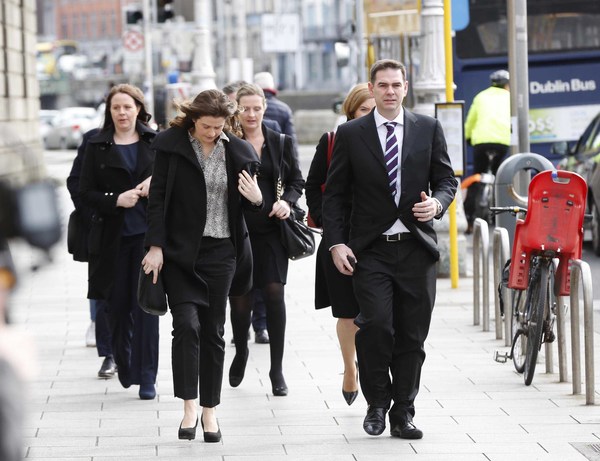
There was a large group of photographers outside the entrance to the Four Courts a few weeks ago as I walked out to the WRC in Ballsbridge for an employment hearing. As I walked past the building entrance the targets of their interest strolled down the street to enter the Round Hall and I guessed, correctly, who they were: “the Quinn children”.
When I say “the Quinn Children” I refer to the adult children of Ireland’s once wealthiest man, Seán Quinn.
Even if I never met them that morning on the quays by sheer coincidence I would have had an interest in their case.
Because their case was one in which they, the Plaintiffs in the action, were suing IBRC, formerly known as Anglo Irish Bank. Their claim was that €415 million guarantees they provided for loans to the Quinn Group in 2007 and 2008 were invalid and, therefore, unenforceable.
When I read that this was the basis of their claim-their cause of action-I was interested to see how they were going to win that argument. For it is an argument that has been made, for the last 10 years or so, by many small business owners, wives and girlfriends of small company directors, who argued that they could not be held to the guarantee they signed.
For all sorts of reasons-for example, signing a document in the kitchen of their home for their spouse who was a small business owner and discovering years later that this document was, in fact, a guarantee and the lender now wanted to be paid.
So, I kept an eye on the case as it was reported in the papers and on TV/radio.
It appeared to be the case that the Quinn children were claiming that they were put under undue influence by their father, Seán Quinn, into signing the guarantees. And what’s more, they claimed they were naïve, inexperienced, and unsophisticated and didn’t understand what they were doing or the significance of the papers they were signing.
This line of argument was, as you would expect, rejected by the bank’s lawyers who pointed out that these ‘children’ were experienced, well educated, professional adults and the notion that they did not understand what they were signing or what it meant was fanciful nonsense.
Significant ruling by Judge-game changer?
But the case took an unexpected turn last week leading to settlement talks which are ongoing. These talks commenced after the Judge, Justice Simons, made a significant ruling in the case.
This ruling hinged on the fact that the Quinn children sued the bank, IBRC, on the basis that the bank had unduly influenced them; but when it came to running the case and giving evidence the case put forward appeared to be that it was Sean Quinn who was the culprit in point of undue influence and overbearing their minds, not IBRC, the defendant.
And last week the children applied to Court to change their statements of claim to reflect this and wished to file supplementary written statements.
Justice Simons, however, refused to grant orders along these lines. He also stated that the argument that their pleadings in the case that Sean Quinn had unduly influenced them were “untenable”. He also said that they
“were unequivocal in stating that the entity against whom the allegation of undue influence was being made was Anglo…Not only is no claim of undue influence made against Sean Quinn Snr in the pleadings, the making of any such claim would, in any event, be entirely inconsistent with the manner in which the litigation has been conducted to date.”
Justice Simons also stated that if Sean Quinn was the ‘guilty’ party in respect of undue influence he should have been named as a defendant. When he asked counsel for the Quinn children why statements along their present course of argument were not included in their original witness statements counsel for the Quinn children admitted there was ‘’no good reason’’.
Significantly Justice Simons decided that if he allowed this change in approach by the Quinn children it would cause prejudice to the defendant, IBRC, as it would not now know what case it was expected to meet.
Moreover, IBRC had a counterclaim against the Quinn children and was entitled to bring that case along without further delays, especially having regard for the fact that this case commenced in 2011.
This ruling, I suspect, was a game changer and prompted the settlement talks.
What I find fascinating about this case, however, is why the claims of undue influence alleged against Sean Quinn were not included in the original statement of claim of the Quinn children.
If you never knew anything about the law, or how legal proceedings are conducted generally, you would probably be raising your eyebrows at a claim of wrongdoing against one party for 8 years and then, when the case is being heard and evidence is being adduced, somebody else is being fingered as the culprit.
You might also raise your eyebrows a little further, I believe, if you knew that all parties in the case had legal professionals who were at the top of their profession and as good as ready money could instruct.
As an outsider looking in I find it fascinating that the case took the turn it has taken as I was looking forward to seeing the final judgment in a high stakes, high profile case. If settlement talks are successful we will never know, although I had my own strongly held opinion which shall remain unventilated.
UPDATE 3rd April, 2019
I held off publishing this post for a couple of days as settlement negotiations were ongoing between the parties. The outcome of those talks were that the Quinn children consented to judgments totaling €440 million being entered against them. This is €88,157,351 against each of them.
They also accepted that IBRC (formerly Anglo Irish Bank) had valid and enforceable claims on the Quinn assets which were the subject of the securities.